Right hemisphere neglect
I am reading Iain McGilchrist’s The Master and his Emissary (available on LibGen) – a very long book about the left/right hemisphere divide. The first few chapters mostly detail what we know about the differences between the left and the right hemisphere, often just one sentence per study.
So far I am very tempted to conclude that my right hemisphere is – unfortunately – either atrophied, heavily repressed, or both. If you, like me, live your life with a constant feeling of “what’s wrong with all those people” – then read on.
Note: I think that strengthening the “right hemisphere” functions could be very useful in terms of (a) leading a happier life and (b) getting things done. The quotes below mostly cover (a) only. I will talk about (b) in later posts.
Familiarity
If it is the right hemisphere that is vigilant for whatever it is that exists ‘out there’, it alone can bring us something other than what we already know. The left hemisphere deals with what it knows, and therefore prioritises the expected – its process is predictive. It positively prefers what it knows.
I don’t enjoy unfamiliar things. I am scared of eating anything I can’t predict the taste of. I don’t get how people can listen to strangers’ playlists on Spotify all day long – when I do it, it’s because I’m willing to do the hard work of finding new music I would like, but I don’t enjoy anything about the process.
I almost always read plots of movies/shows before watching them – I don’t want to spend even a minute thinking “will they, won’t they”. I ask people to always check with me before buying me gifts, so that they would not accidentally get me something I would not like. Nobody seems to get that “it won’t be a surprise anymore” doesn’t matter at all – the feeling of surprise is momentary, and being stuck with a slightly inferior gift is forever.
Faces
[...] the right hemisphere uses unique referents, where the left hemisphere uses non-unique referents. It is with the right hemisphere that we distinguish individuals of all kinds, places as well as faces.
[...] Right-brain-damaged patients are not only poorer at identifying faces, compared with left-brain-damaged patients, but are poor at assessing such features as the age of a face with which they are not familiar.
I can’t distinguish faces well. When I’m watching a movie with someone, I would occasionally ask “is this guy the same guy we’ve seen before?”. On one level it’s not obvious to me that it’s the same guy, but on another level, even if I could take a guess, I don’t want to. I feel somewhat proud of not being able to recognize faces, or of not being able to spot familiar actors in movies, and I always make it known.
I always felt that written communication was in every aspect as good as face-to-face communication, and assumed that people were vehemently disagreeing because they couldn’t type fast, or lacked the ability to express themselves well via text, or something along those lines.
I used to never make eye contact when talking to people. I do now, but I have to force myself and it’s a bit scary.
People
In fact it is precisely its capacity for holistic processing that enables the right hemisphere to recognise individuals. Individuals are, after all, Gestalt wholes: that face, that voice, that gait, that sheer ‘quiddity’ of the person or thing, defying analysis into parts.
I remember a conundrum from a few years ago: everyone says you are supposed to treat your friends as “unique”, but they just happen to be my friends because I met them. If I met someone else, I would be friends with someone else. How can I justify treating anyone in my life as “unique” then?
Oh, and Tim Minchin’s If I Didn’t Have You:
Your love is one in a million
You couldn’t buy it at any price
But of the nine-point-nine-nine-nine-hundred-thousand other possible loves
Statistically, some of them would be equally nice
So I trust it would go without saying
That I would feel really very sad
If tomorrow you were to fall off something high
Or catch something bad
But I’m just saying
I don’t think you’re special
I-I mean, I think your special
But you fall within a bell curve
Emotions
Although there has been much debate about the particular emotional timbre of each hemisphere (of which more shortly), there is evidence that in all forms of emotional perception, regardless of the type of emotion, and in most forms of expression, the right hemisphere is dominant.
[...] As well as emotional recognition, the right hemisphere plays a vital role in emotional expression, via the face or the prosody of the voice. The right frontal lobe is of critical importance for emotional expression of virtually every kind through the face and body posture. The one exception to the right hemisphere superiority for the expression of emotion is anger.
I’m low on empathy, I am somewhat unemotional, and I am often told that what my face shows doesn’t match the emotional content what I’m saying. Bingo.
Body
In keeping with its capacity for emotion, and its predisposition to understand mental experience within the context of the body, rather than abstracting it, the right hemisphere is deeply connected to the self as embodied.
[...] The right hemisphere, as one can tell from the fascinating changes that occur after unilateral brain damage, is responsible for our sense of the body as something we ‘live’, something that is part of our identity, and which is, if I can put it that way, the phase of intersection between our selves and the world at large. For the left hemisphere, by contrast, the body is something from which we are relatively detached, a thing in the world, like other things [...], devitalised, a ‘corpse’.
I don’t have any special feelings towards my body. I think it would be fun living in a different one as long as it was not worse than my current one.
I don’t have an attachment to my gender identity as well (though if I woke up one morning and found out I was turned into a girl, I would be worried about the periods). I used to heavily dislike both excessive masculinity and excessive femininity.
Labels
How do you know it’s winter?
Anything that requires indirect interpretation, which is not explicit or literal, that in other words requires contextual understanding, depends on the right frontal lobe for its meaning to be conveyed or received. The right hemisphere understands from indirect contextual clues, not only from explicit statement, whereas the left hemisphere will identify by labels rather than context (e. g. identifies that it must be winter because it is ‘January’, not by looking at the trees).
Here is what I see outside – take a look:

It so happens that it’s January right now, but there is no snow, and the sky is blue. It took me about ten seconds to find anything that could be used to determine the season, even though the previous paragraph literally says “looking at the trees”. Huh.
Gear shift. I remember how my ex-girlfriend didn’t want to call me her boyfriend – because she disliked labels. Not only it was super scary, but I also couldn’t get what did she even mean by disliking labels. “This is not a ‘label’, this is how things are – why would you ever not want to admit it?”
Taking things literally
The right hemisphere takes whatever is said within its entire context. It is specialised in pragmatics, the art of contextual understanding of meaning, and in using metaphor.It is the right hemisphere which processes the non-literal aspects of language, of which more later. This is why the left hemisphere is not good at understanding the higher level meaning of utterances such as ‘it’s a bit hot in here today’ (while the right hemisphere understands ‘please open a window’, the left hemisphere assumes this is just helpful supply of meteorological data).
I will not take “it’s a bit hot in here today” as anything other than “it’s a bit hot in here today”. If you tell me that you meant “please open the window”, and I’m generally allowed to shout at you, I will be tempted to. Why didn’t you just say that you want me to open the window? Ugh.
I know that “how are you doing?” means “hello”, but nine times out of ten I will still tell you how I’m doing. I used to actually give people a rundown – this is how I’m feeling at the moment, today, this week, and this month. I don’t do this anymore, at least.
Consistency
The left hemisphere, because its thinking is decontextualised, tends towards a slavish following of the internal logic of the situation, even if this is in contravention of everything experience tells us. This can be a strength, for example in philosophy, when it gets us beyond intuition, although it could also be seen as the disease for which philosophy itself must be the cure; but it is a weakness when it permits too ready a capitulation to theory.
For me, consistency and “following of the internal logic of the situation” are very important. I readily bite philosophical bullets. For instance: given how much chicken suffer in farms, buying a chicken breast is not worse – in terms of consequences – than torturing a cat, so if you don’t hate people who enjoy going to KFC, you are not allowed to hate people to torture cats. (I found a way around it – statistically there is probably something wrong with people who torture cats, so not wanting to be around them makes sense. Still, hating them doesn’t.)
Whenever I remember about the heat death of the universe, for a moment I distinctly feel “maybe I should just die, because in the end the universe won’t exist anyway and nothing I did would matter at all”. As long as I don’t remember about it, though, I’m fine. On the other hand, I bite the “cloning consciousness” bullet as well – it’s okay to clone me and kill the original version. It doesn’t mean I wouldn’t be scared – it only means that I feel like I shouldn’t be.
Knowing things vs. looking things up
When I’m in an unfamiliar place, I will use Google Maps for everything. Even if I’m going somewhere that is five minutes away, and I have been there before, I will still check the map. If someone tells they don’t have maps installed, I pity them, and if it’s on purpose, I treat them with suspicion. In fact, I’m actively rooting for maps in the maps–humans battle – if someone tells me “oh, I know a faster route”, I don’t think “this is cool”. I think “aw shit, I want the map to always know the best route, I want it to always beat you, ugh”.
Things that exist vs. hypotheticals
The left hemisphere operates an abstract visual-form system, storing information that remains relatively invariant across specific instances, producing abstracted types or classes of things; whereas the right hemisphere is aware of and remembers what it is that distinguishes specific instances of a type, one from another. The right hemisphere deals preferentially with actually existing things, as they are encountered in the real world.
I hate it when people say “some things shouldn’t be joked about”. I sort of get the concept, but it still makes me very irritated. A joke is a hypothetical, and all hypotheticals are allowed. “Ugh, I have a headache” — “Maybe you have head cancer?”. Alright, granted, not the most amusing joke. But why would you get angry?
On the other hand, thinking about hypotheticals is just as interesting as thinking about the real world. Some people try to subvert this – you tell them “let’s assume X” and they tell you “but this is not what happens in the real world”. Geez, I specifically said “assume”. Why won’t you slavishly follow the internal logic of the situation? Why?
In the Harris–Klein debate, I am firmly on Harris’s side.
Abstract paintings
It has to be said that, though it is involved with emotion, the left hemisphere remains, by comparison with the right, emotionally relatively neutral, something which is evidenced by its affinity for ‘non-emotional’, abstract paintings.
A friend was choosing a T-shirt for me. Here are literally the instructions I gave:
I like abstract things
I don’t like logos or text or generally things that show affiliation (cartoon characters etc)
I also don’t like patterns covering the whole T-shirt, but I don’t know why
When I was a kid, I had “crafts” lessons and I hated them. I can only remember two drawings I did: one was a tracing of my hand, with a different color for each finger, and the other was an eye with circle-shaped patterns in it. And of course, I used a pair of compasses instead of drawing the circle-shaped patterns by hand.
Belonging
I have a need to take account of myself as a member of my social group, to see potential allies, and beyond that to see potential mates and potential enemies. Here I may feel myself to be part of something much bigger than myself, [which requires] more of an open, receptive, widely diffused alertness [that the right hemisphere specializes in]
Until recently, I didn’t feel the need to belong. I figured out that some people wanted to achieve things, and some people felt more comfortable helping others achieve things, and my feelings towards the latter group could be summarized as “you are useful, granted, but I would never ever want to be you, or even to be friends with you”.
A co-worker mentioned they were going to a protest; I made an incredulous face and told them that surely it was much more useful to organize one than to attend one.
P.S.
I think that all those things are fixable.
In other words, I don’t think that I lack the actual capacity to do anything from the above – e. g. improv seems to be squarely in the right hemisphere department, but when I tried it, it was fine. (I was still scared of it, but it was fine.)
I don’t know how exactly it could be fixed, but I have a hunch. We’ll see. In the meantime, if you have any ideas, leave a comment or DM me on Twitter: @availablegreen.



چهره های خسته و پیراهن های مچاله و خال دار با نقاط رنگی: اینها مناظر رایجی هستند این روزها سوار شوید در مورد سنگینی جدید در سنگاپور صحبت شده است. این ویروس برای ماندن اینجاست ، اما زندگی باید ادامه یابد ، البته با احتیاط بیشتر. مترادف این عادی جدید ایستگاه های غربالگری دما در مراکز خرید ، محل کار و امکانات دولتی ظاهر می شوند.
قبلاً “اسلحه” تب سنج دیجیتالی مادون قرمز شبیه تپانچه در تلاش برای جلوگیری از SARS و اقدامات مهار ابولا در آفریقای غربی استفاده شده است. تنها تفاوت این بار مقیاس استقرار است. در سراسر جهان ، کشورها از اسلحه های تب سنج دیجیتالی در ایستگاه های قطار ، فرودگاه ها ، بیمارستان ها و حتی فروشگاه های مواد غذایی استفاده می کنند تا تلاش کنند ناقلان احتمالی ویروس را شناسایی کنند. سنگاپور نیز از این قاعده مستثنی نیست.
برای آقای Ng ، نگهبانی که وظیفه اندازه گیری دما را بر عهده دارد ، این اقدامات بی نتیجه به نظر می رسد. دما بسیار تصادفی بالا و پایین می رود. درجه حرارت بسیاری از آنها 34-35 درجه است و تب کمی نیز افزایش یافته است. برای بیان این موضوع ، در دمای بدن زیر 35 درجه ، به احتمال زیاد دچار هیپوترمی هستید وضعیتی که در نهایت منجر به نارسایی کامل قلب و سیستم تنفسی شما و حتی مرگ می شود. در حالی که برخی ممکن است خوانش های آقای را به تجهیزات معیوب نسبت دهند ، به نظر می رسد در اینجا روند گسترده تری وجود دارد. یک پیمانکار کولر گازی نیز اظهار داشت که درجه حرارت او در طول روز به شدت متغیر است ، گاهی اوقات به صورت متوالی. این تب سنج دیجیتالی از لا استفاده نمی کند ، فقط دردسرساز است.
https://vinteb.com/تب-سنج-دیجیتالی-غیر-تماسی/